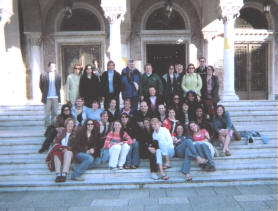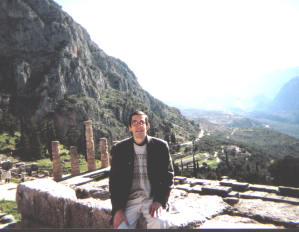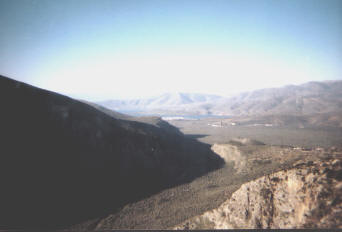Greek Week
part one
ahead to part two
ahead to part three
| In the spring of 2005 I traveled to Greece with the St. Paul
Saints, a chorus of high school girls who form an "elite singing group". Every
couple of years they take a concert tour to some distant land. Since they were
in need of an accompanist, and I didn't mind spending a week in Greece, off we
went. It was spring break
and I needed something to do anyway. What sorts of things can you expect from a trip to Greece in mid-march? Well, 70 degree weather, mostly, very little rain, and, of course, the Greek specialties--ancient ruins everywhere, picturesque mountains overlooking sparkling blue seas, invigorating music, relaxed and happy citizens, persistent merchants, friendly cats and dogs, feta cheese, more 70 degree weather--I mean, if you're into that sort of thing. |
 |
Of course, you may have to consume souvlaki on a daily basis, and there might be that occasional puzzling bathroom fixture at the resort hotel, and there is, at this moment, an unfortunate relationship between the dollar and the euro--but I sense you have given me enough sympathy already and it is time to move on.
When we landed in Athens the sun was setting on Friday; but as we were to begin our tour in Delfi, about three hours away, there was a coach waiting for us at the airport, and after some 20 hours on the plane, we hopped aboard the bus after briefly meeting some people I thought were our tour guide and courier.
On the bus the girls entertained themselves by reading aloud from a very silly book and introducing themselves to their accompanist. (I had played for them a few times before but didn't know any of them). I entertained myself by seeing if I could stay awake just long enough to adjust to Greek time and get a good night's rest into the bargain, and by getting increasingly nauseas and impatient. As we got farther and farther from Athens, the rural road to Delfi became increasingly hazardous, but unlike my experience with winding roads in the mountains of Taiwan I never felt like my life was in danger. Apparently one of the girls did not share my sense of well-being. "Mr. Hammer, aren't we on the wrong side of the road?" "No, they drive on the right in Greece." "I thought they drove on the left in Europe." "No that's just England." "Oh..." she said, not sounding very convinced.
We stopped at a rest area on the way to Delfii that boasted sandwiches consisting of locally made parts. They were fabulous. So was the chance to stop moving for the first time in several hours. I tried to write down some of the things that had already happened on this trip, but on thirty hours without sleep, I was unable to put any thoughts together.
|
|
We were just enjoying a moment of
tranquility at that table, and I was getting my first introduction to the
cast of characters I would be spending the next week with. One was my roommate Bob, who, since he offered me
part of his sandwich, I figured must be a nice fellow. After some internal
hesitation, I observed to him that he looked a little like Socrates (hoping he
doesn't get that all the time). He didn't take it too badly.
|
Back in the coach, we continued to wind our way across the Grecian countryside. It was starting to get a little old. The more traveling I do the more I realize that there is an awful lot of long and winding road on this planet. There is also plenty of middle of nowhere. In Greece, though, even the middle of nowhere is beautiful. Unfortunately it was pitch dark at that point so those stunning views would have to wait. We did drive through at least one town which was all lit up against the darkness. It boasted a phenomenal hotel and an amazing view of the sea. But, alas, we kept going. It turned out to be our longest bus trip and it came after 20 hours by plane. I was getting a little motion-sick and seriously wanted to get to bed. But things were about to improve greatly.
We arrived in Delfi, a small town whose major highway was so narrow that we had to unload our luggage in the middle of the road and squish up against the bus whenever a car came along. The hotel was built into the side of a cliff; the lobby was actually on the seventh floor, and our rooms were a few stories below.
I had managed to avoid sleep for about 30 hours on the trip over so I had no difficultly logging a good night's rest. The next morning we awoke to a sleepy little town with only two small roads and almost no signs of life. I experienced my first Greek breakfast, consisting of items I would get to know very well in the next week: scrambled eggs, ham, provolone cheese, aerated orange juice and some unidentified red fruit juice, raw bacon, and feta cheese.
|
After breakfast I strolled placidly through town. It was very peaceful. There was a fork in the road; I traveled down one of the small, winding roads with small houses on either side and a stunning view of the valley down below. The birds said hello; in the distance church bells began to ring. I made my way back to the hotel. We were going to see the oracle; or what is left of it. |
|
|
| In ancient Delphi there was a fissure in the earth; gases bubbled up through it, and one woman, designated the oracle, would breathe the fumes, become dizzy, and predict future events. If you are a child of the 60s I do not need to explain how this works. Naturally an event of this kind needed some packaging; a temple, or rather a complex of temples, was erected. Pilgrims came from all over. Only important persons were granted an audience with the oracle; if a king wanted to know if he would have success in battle he would bring his entourage, but they would have to wait outside while he went in to consult with the oracle. Ancient tourists came and left graffiti records of their presence chipped into the stones around the temples. Today birds are leaving their records, the acidic content of which, over time, will erode the stone blocks. If you are of the opinion that the world keeps getting worse you'll be happy to note that an ancient system of graft was already in place in Delphi; persons--that is, royal persons--who left expensive gifts could skip the long lines that formed to see the oracle and get in to see her immediately. Even then, the gods favored the rich. |
ruins of an ancient amphitheater in which athletic contests were held,
similar to the ones in Olympia a few centuries later.
Someone needed to underwrite such grandeur. Treasuries were built to thank the oracle for favorable predictions. Little remains of such once impressive edifi now, but in the days before digital photography some tourists were patient enough to draw everything they saw; the authorities are able to reconstruct models of nearly everything in ancient Greece on the basis of this testimony.

Down the mountain from the oracle is another incredible view. The columns behind me are ruins of the entrance temple at Delfi.
|
The oracle became famous for its ambiguity: a king, wishing to make war on another kingdom, was overjoyed to learn that "a mighty kingdom will be destroyed." It turned out, in retrospect, to have been his own kingdom.
| The oracle is no longer there. I had been wanting
to learn about the success of our first concert, but the human line of oracles
has run out. Their successor, when we visited, appears to be a cat. It is
impossible to tell, since, in the days before acquiring a digital camera with a
zoom lens (hint, hint), I couldn't get a close up, but the cat only has one eye.
This, of course, means that it is gifted with second sight, or the ability to
foretell the future.
Cats and dogs are all over Greece, and they are not the over-stimulated American variety; the dogs are universally friendly but mellow, and the cats are all sages who do not need to take cover as soon as you are in sight. They've seen it all before. Now it is time to return to the bus and ride the rest of the way across Greece, east to west. Yesterday we landed in Athens, which is on the eastern coast of Peloponnesus, or the island-like portion of Greece. This afternoon we will arrive in Messolongi, a small town just north of the gulf of Corinth on the western coast.
|
|
We have been spending a great deal of time in the bus. It is a magnificent beast with a massive bay-window, which comes in handy when sheep are crossing the road, or a spectacular view is in front of us. We have been traveling with three persons this week, all of whom consummate professionals and with interesting personalities to boot. The first is our tour guide, Ioanna. In Greece, tour guides must be licensed by the state, and, unlike the practice in other countries where your courier remains constant but you meet your new tour guide in each city you visit, Ioanna will be with us the entire trip which means she has to know everything about everything. And she seems to. If she does not know every square inch of Greece those that remain are very unimportant square inches. Every time the coach rolls on she takes the microphone three or four times to tell us about that interesting pile of rocks on our left or the castle atop the mountain in the distance to our right. She's also well versed in the mythology and history of the country. Our courier, Tassos, says she is the best tour guide he has ever worked with.
Tassos can work a crowd. He is a musician himself; he works with the Vienna boy's choir and is a conductor. He will be able to show me later where I can get some Greek piano music. But he knows how to work with a group of teenage girls, telling jokes and being generally zany on the bus, when he isn't attending to details and making the trip run smoothly. Soon he has picked up Miss Mack's form of address to the choir and is calling everybody "Angels", as in "Ok, Angels, now we are going to stop for lunch...." At one point he is singing a Tchaikovsky waltz complete with imitations of muted trumpet and plucked strings. Tchaikovsky rarely gets so many laughs.
| The third member of the triumvirate is Kostas, the bus driver. And he certainly deserves recognition. He drove in the Olympics, I am told. Of course, bus driving was not an Olympic event, though drivers were needed aplenty in Athens, where the 2004 summer games were held. It is a shame, because Kostas could surely have medaled. On several occasions he was able to get the bus around some extremely tight turns with hardly a centimeter on either side; we took to applauding him like a concert artist after each of his amazing feats of bustidigitation. I've taken to calling him "Busmaestro" because I believe that kind of excellence in any field deserves special attention, and because, as I observed in an email I sent on our fifth day in Greece, I am under the impression he could carve a turkey with a bus. |
|
But this, our first day in Greece, might well have been the most interesting, and it owes that position in no small way to our stop in Messolongi. A small town which was nevertheless the scene of an important battle during the Greek war for independence, in which the Greeks kept the Turks at bay for a year, it reminds me of a cross between the little burg where I grew up (one square mile) and the Alamo. The city officials are quite excited about our coming, and are there to greet us when we debus. I get to shake hands with the Vice-Mayor of Messolongi, but thoughtlessly washed my hand afterward.
|
The Garden of Heroes in Messolongi |
There are posters of us all over town; we will be giving our first concert
there this evening. But before we do, there is a trip to the Lord Byron museum.
Lord Byron was very interested in the plight of the Greeks during the early 19th
century and gave money to help the war effort when they tried, at first
unsuccessfully, to be rid of the Turks. Byron's heart is literally buried in Messolongi; the rest of him is interred in England. Some of the girls thought
the phrase "his heart will always be with the Greek people" was a nice bit of
metaphoric twaddle--nothing could be more literally true. They love Byron here;
we were all presented with posters of the man and given a tour of the museum by
a very proud city official. As we were shortly due for a pre-concert rehearsal
on location it was supposed to be a condensed version of that episode in Greek
history, but his enthusiasm for the subject wouldn't permit it. Ioanna condensed
him anyhow upon translation. A few persons who spoke Greek in our group got a
large charge out of the difference between the original and the translation;
Ioanna was trying to move things along but we still arrived at the concert hall
only twenty minutes or so before the concert was to begin.
|
We needn't have worried. In Greece, a 7 o'clock start is only an approximation. Sometime around 7:30 the program opened with a bunch of adorable kids singing what were apparently very funny songs in Greek. They wore colorful costumes. It is Carnival time in Greece; lent is to begin in only a few days by the Orthodox calendar, and these kids are celebrating this glorious time of year in song, accompanied by a guitar. Tassos is sitting next to me; after the first phrase he bursts out laughing: the songs must be hilarious. I ask him to translate them for me later. Unfortunately, I can't remember them now. One was about a lost cow, I think.
A women's chorus comes on and sings a few numbers. They are accompanied by a pianist and a guitarist who has a tendency to get lost during his solos. This is a small town; musical performances do not always go smoothly. After their exit, it is our turn. The Saints rise from the back of the hall and come down the aisles to that song Ella Fitzgerald used to sing, "A Tisket, a Tasket." It is very lively, and I need to add a few bars to the introduction to make sure the girls can make it all the way to the stage before they start to sing. I'm also glad to report there were no deaths at the top of the stairs where there was a strange drop-off in the aisle. I must have tripped on that thing five times before the concert.
As the concert progresses, Miss Mack seems to be having a lot of fun. Being musical director of a 20 voiced high school girls choir does seem like it would have some stresses. In the days before the trip she is setting the bar high and upbraiding the girls for all sorts of musical trespasses. At one point during the concert the altos give her exactly what she asked for days earlier: they bring out their line cleanly and boldly. She smiles broadly and blows them an audible kiss. I almost lost my concentration over that one!
Between songs, the girls have memorized speeches about the songs; what we just sang, what we are singing next, how great it is to be in Greece. Realizing that few in our audience speak English, Tassos becomes our translator, a practice he continues in Navplion, the site of our next concert. One of our pieces is from Walt Disney and there is a line in one of the speeches about a message of peace and brotherhood being present "in the form of a small talking mouse named Mickey." It is funny to see Tassos's face while he figures out how he's going to translate that line.
After the concert we attend a dinner with the city officials of Messolonghi. They are very generous people. I sit near the mayor, who works particularly hard. In a few days we will get sick of drinking "Coke Light" (no diet coke available in small towns in Greece) but today we are looking forward to it. We each order one and, unbeknownst to us, the mayor sends his assistant out in search of the beverage which the restaurant has run out of. The meal is wonderful and the townspeople very warm. The mayor and I are able to make minimal conversation in English, but when one of the men in the group asks how the political system works in Messolongi, it is time to send for Ioanna to translate for us. It is a very pleasant conversation. I tell the mayor afterward that he has my vote.
The people of Messolongi have a lot to be proud of and we board the bus to our next destination thinking that we very well may have already spent our single most interesting day in Greece.
